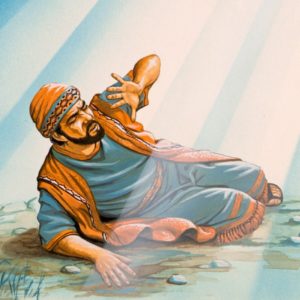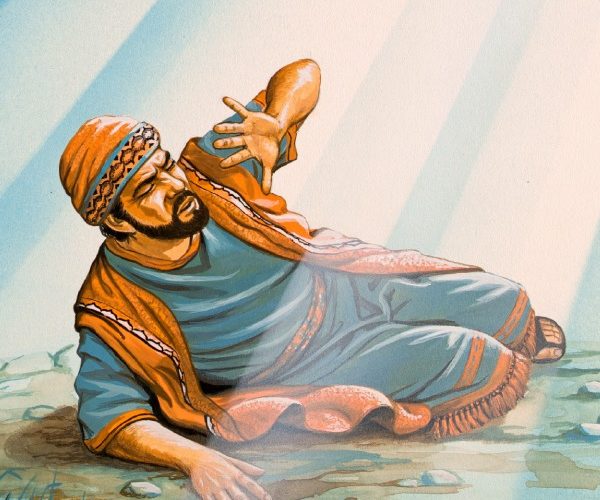The Conversion of Saul of Tarsus
Podcast: Play in new window | Download
Subscribe: RSS
 TITLE: The Conversion of Saul of Tarsus
TITLE: The Conversion of Saul of Tarsus
SUBJECT: Conversion
PROPOSITION: In the conversion of Saul we see 1) Confrontation, 2) Contrition, 3) Concern, and 4) Conversion.
OBJECTIVE: To study and understand the conversion of Saul so that we may explain it to others.
AIM: To understand how Saul’s conversion serves as a model for everyone’s conversion.
INTRODUCTION:
1. Read: Acts 9:1-9
2. About the Text:
1) Acts chapter 7 shows to us the death of Stephen.
2) Acts 8 tells about a great persecution that arose against the church.
3) Saul was at the head of this effort.
4) The church was scattered throughout Judea and Samaria.
5) The threat against the church was serious.
6) Something had to be done about Saul, the greatest enemy of the church.
3. Ref. to S, T, P, O, and A.
DISCUSSION: In the conversion of Saul we see . . .
I. Confrontation
1. Saul’s Persecutions Continued
1) He requests letters to bind disciples from Damascus and bring them to Jerusalem
2) His persecution has expanded beyond Jerusalem.
3) Acts 22:4-5 “And I persecuted this way unto the death, binding and delivering into prisons both men and women. As also the high priest doth bear me witness, and all the estate of the elders: from whom also I received letters unto the brethren, and went to Damascus, to bring them which were there bound unto Jerusalem, for to be punished.”
4) Acts 26:9-12 “I verily thought with myself, that I ought to do many things contrary to the name of Jesus of Nazareth. Which thing I also did in Jerusalem: and many of the saints did I shut up in prison, having received authority from the chief priests; and when they were put to death, I gave my voice against them. And I punished them oft in every synagogue, and compelled them to blaspheme; and being exceedingly mad against them, I persecuted them even unto strange cities. Whereupon as I went to Damascus with authority and commission from the chief priests,”
2. Jesus confronts Saul.
1) Saul is on the road to Damascus about noon (Acts 22:6, Acts 26:13).
2) He saw a great light from heaven shining, brighter than the sun (Acts 22:6, 26:13)
3) This light was seen by those journeying with him (Acts 26:13).
4) He and those who were journeying with him fell to the earth (Acts 26:14).
5) Saul then hears a voice in the Hebrew tongue (Acts 26:14): “Saul, Saul why are you persecuting me? It is hard for you to kick against the pricks” (Acts 26:14).
6) Saul asks, “Who are you, Lord.”
7) The voice answers, “I am Jesus of Nazareth whom you are persecuting. It is hard for you to kick against the pricks” (Acts 9:5).
3. Jesus selects Saul.
1) Saul answers and says, “Lord, what shall I do? What will you have me to do?”
2) First, Acts 26:16-18 tells us the Lord’s full purpose for Saul, “But rise, and stand upon thy feet: for I have appeared unto thee for this purpose, to make thee a minister and a witness both of these things which thou hast seen, and of those things in the which I will appear unto thee; Delivering thee from the people, and from the Gentiles, unto whom now I send thee, To open their eyes, and to turn them from darkness to light, and from the power of Satan unto God, that they may receive forgiveness of sins, and inheritance among them which are sanctified by faith that is in me.”
3) For the immediate future, Jesus says to Saul,
a. “Arise, and go into the city, and it shall be told thee what thou must do” – Acts 9:6
b. “Arise, and go into Damascus; and there it shall be told thee of all things which are appointed for thee to do” (Acts 22:10).
4) Saul was not told directly what to do to gain forgiveness.
II. Contrition
1. The time of Saul’s Contrition – Acts 9:9 ” And he was three days without sight….”
2. The trial of Saul’s Contrition – blindness.
1) In Acts 22:11 Paul said, “And when I could not see for the glory of that light, being led by the hand of them that were with me, I came into Damascus.”
2) Acts 9:9 ” And he was three days without sight….”
3) God used blindness to communicate condemnation and separation.
a. In Genesis 19:11 the men of Sodom are struck with blindness.
b. It was one of the curses reserved for the disobedient (Deuteronomy 28:28).
c. Blindness made one unfit for the priesthood (Leviticus 21:18).
4) Saul understood the seriousness of his errors.
3. The thoroughness of Saul’s Contrition – fasting.
1) Acts 9:9 ” And he was three days without sight, and neither did eat nor drink.”
2) Fasting was a customary way to express sincere and deep contrition.
a. David fasted when his child was ill (2 Samuel 12:16).
b. Samuel had the people fast in relationship to their sinfulness (1 Samuel 7:6).
3) Fasting was associated with prayer as well.
a. In Acts 9:11 the Lord told Ananias that Saul was praying also.
b. Acts 13:3 – this was done before Paul and Barnabus went on their first journey.
c. It was also done when ordaining elders (Acts 14:23).
4) Fasting was an act that was associated with the most serious of circumstances.
III. Concern
1. The Lord appears to Ananias in a vision.
1) Ananias was a disciple at Damascus (Acts 9:10).
2) Ananias listened.
3) The Lord said to Ananias:
a. Go to “Straight Street” to the house of Judas.
b. Enquire there for Saul of Tarsus. He is praying.
c. He has seen a vision of you putting your hands on him to receive his sight.
2. Ananias expresses his concern.
1) He expressed how much evil Saul had done to the saints in Jerusalem.
2) He related how Saul had authority to bind all that call on Jesus’ name.
3. Jesus explains to Ananias further.
1) Go! Saul is a chosen vessel.
2) He will bear my name before kings and the gentiles.
3) He will suffer many things for my name’s sake.
4. The Lord expected Ananias to preach the gospel to Saul.
IV. Conversion
1. Ananias found Saul and told him what to do.
1) He entered the house, and he put his hands on Saul.
2) He said, “Brother Saul, the Lord, even Jesus, that appeared unto thee in the way as thou camest, hath sent me, that thou mightest receive thy sight, and be filled with the Holy Ghost” (Acts 9:17).
3) We have Ananias’ extended words in Acts 22:13-16 “Brother Saul, receive thy sight. And the same hour I looked up upon him. And he said, The God of our fathers hath chosen thee, that thou shouldest know his will, and see that Just One, and shouldest hear the voice of his mouth. For thou shalt be his witness unto all men of what thou hast seen and heard. And now why tarriest thou? arise, and be baptized, and wash away thy sins, calling on the name of the Lord.”
4) We see the order of the events here.
a. Ananias comes to the house.
b. He lays his hands on Saul, and Saul receives his sight.
c. Ananias tells Saul that he must become a witness.
d. Ananias commands Saul to immediately be baptized to wash away his sins.
5) Acts 9:18 summarizes these events, “And immediately there fell from his eyes as it had been scales: and he received sight forthwith, and arose, and was baptized.”
2. Saul Preached in Damascus.
1) Acts 9:19-22 “And when he had received meat, he was strengthened. Then was Saul certain days with the disciples which were at Damascus. And straightway he preached Christ in the synagogues, that he is the Son of God. But all that heard him were amazed, and said; Is not this he that destroyed them which called on this name in Jerusalem, and came hither for that intent, that he might bring them bound unto the chief priests? But Saul increased the more in strength, and confounded the Jews which dwelt at Damascus, proving that this is very Christ.”
2) Acts 26:19:20 – “Whereupon, O king Agrippa, I was not disobedient unto the heavenly vision: But shewed first unto them of Damascus, and at Jerusalem, and throughout all the coasts of Judaea, and then to the Gentiles, that they should repent and turn to God, and do works meet for repentance.”
3) The preaching of Saul was so great, the Jews plotted to kill him (Acts 9:23-24).
CONCLUSION:
1. In the conversion of Saul we see . . .
1) Confrontation
2) Contrition
3) Concern
4) Conversion
2. Paul’s conversion is a wonderful example of God’s forgiveness.
1) Paul told Timothy, “And I thank Christ Jesus our Lord, who hath enabled me, for that he counted me faithful, putting me into the ministry; Who was before a blasphemer, and a persecutor, and injurious: but I obtained mercy, because I did it ignorantly in unbelief. And the grace of our Lord was exceeding abundant with faith and love which is in Christ Jesus. This is a faithful saying, and worthy of all acceptation, that Christ Jesus came into the world to save sinners; of whom I am chief. Howbeit for this cause I obtained mercy, that in me first Jesus Christ might shew forth all longsuffering, for a pattern to them which should hereafter believe on him to life everlasting” (1 Timothy 1:12-16).
2) This goes to show that if Paul can be saved, anyone can.
3. Invitation

